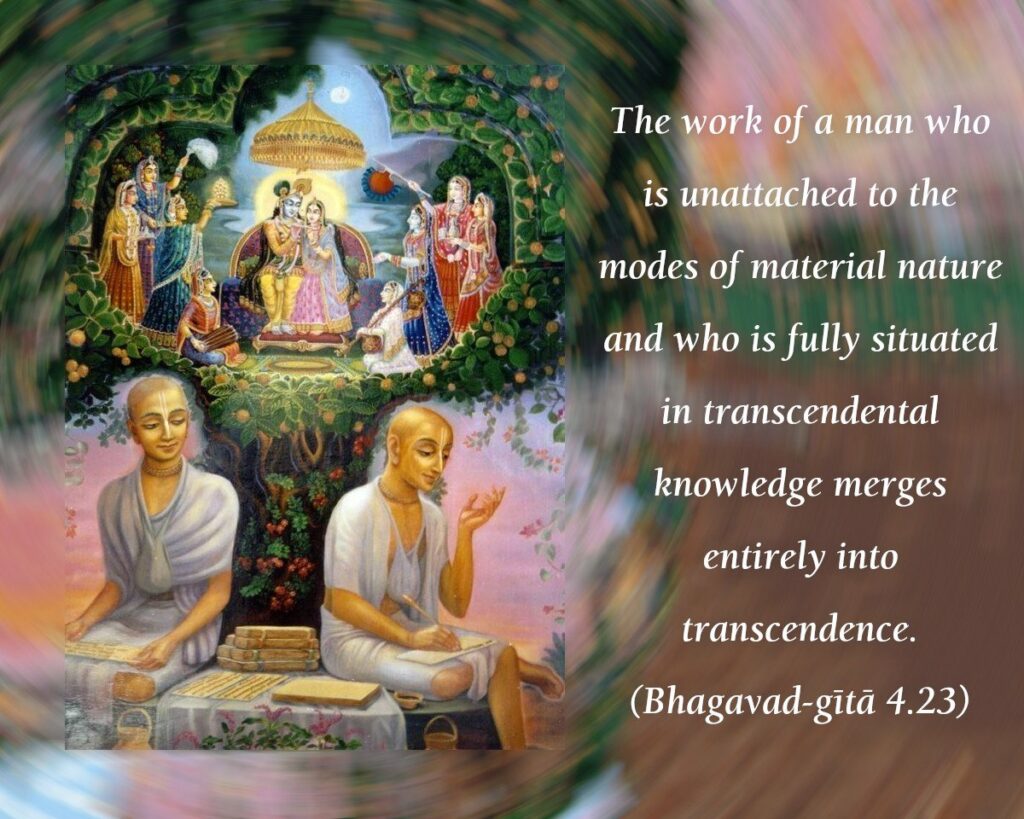गतसङ्गस्य मुक्तस्य ज्ञानावस्थितचेतस: |
यज्ञायाचरत: कर्म समग्रं प्रविलीयते || 23||
gata-saṅgasya muktasya jñānāvasthita-chetasaḥ
yajñāyācharataḥ karma samagraṁ pravilīyate
gata-saṅgasya—free from material attachments; muktasya—of the liberated; jñāna-avasthita—established in divine knowledge; chetasaḥ—whose intellect; yajñāya—as a sacrifice (to God); ācharataḥ—performing; karma—action; samagram—completely; pravilīyate—are free
Translation:
Of the man who is devoid of attachment, who is liberated, whose mind is established in knowledge, the whole action performed in the spirit of sacrifice is dissolved.
Commentary:
The essential qualities of the man of Knowledge are described here (1) Non-attachment, (2) freedom from desire and hatred, attraction and repulsion, (3) absorption in Atma, (4) performing work in a spirit of sacrifice. The Karma of the sage who possesses these qualities is entirely dissolved.
Whose mind is established in Knowledge: The mind of the sage is established in Knowledge. Such Knowledge is the result of non-attachment to the fruits of work, and liberation from agitations of desire and hatred. For such a man, though he is engaged in a thousand actions, all that he does is totally dissolved in the ocean of Knowledge. So it is clear that Knowledge of Self is the only way to cut the bonds of karma. Without true Knowledge, man is inevitably bound to the material world through his unrestrained senses and mind and what he does is motivated by desire and egotism, and so he binds himself to the wheel of samsara. This bondage is the creation of man’s own mind and is not the effect of the objective world. In fact, the objective world exists as it is, and man attaches himself to it by his past samskaras and suffers the unavoidable consequences of birth and death. The sage has discovered the original freedom of his own Self and so he has released himself from the enslaving forces of the senses and the mind. Such a man is not bound by karma, because there is no desire for personal enjoyment and there is no feeling of doership. His work is thus dissolved in Knowledge.
Performed in the spirit of sacrifice: In the Third Discourse, it has already been stated that work done with any other motive except as dedicated to the Lord, as Dharma or as service to humanity, will cause bondage.
It dissolved: It is emphatically stated here that nothing remains of karma for the man who has realised Brahman. Sanchita and Agami karma are destroyed in the fire of Knowledge. Only Prarabdha remains as long as the body lasts, and when the body falls, it is all over. There is no mind, no karma to lead to further births.
These ideas are a source of great thought for the man of action, the devotee, and the aspirant for liberation. All of these are seeking emancipation from the bondage of karma. And the message of the Gita is not the abandoning of action but the freedom of man through right action. The secret is revealed how a man should work and yet remain free from being caught in the meshes of karma.
Bhagavad Gita: Chapter 4 🔻 (42 Verses)
